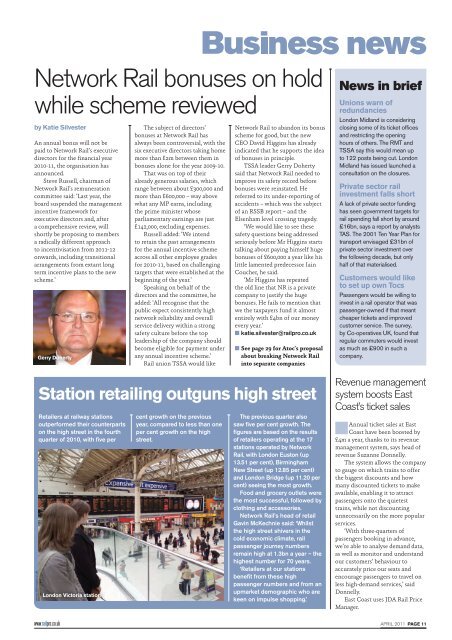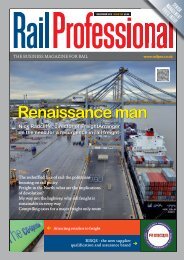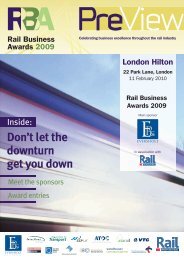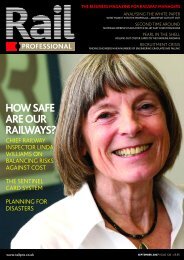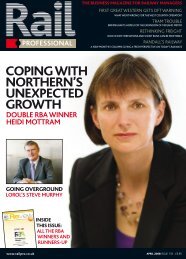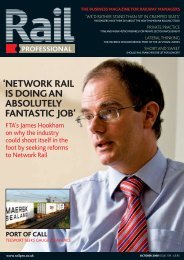View as PDF - Rail Professional
View as PDF - Rail Professional
View as PDF - Rail Professional
Create successful ePaper yourself
Turn your PDF publications into a flip-book with our unique Google optimized e-Paper software.
Network <strong>Rail</strong> bonuses on hold<br />
while scheme reviewed<br />
by Katie Silvester<br />
An annual bonus will not be<br />
paid to Network <strong>Rail</strong>’s executive<br />
directors for the financial year<br />
2010-11, the organisation h<strong>as</strong><br />
announced.<br />
Steve Russell, chairman of<br />
Network <strong>Rail</strong>’s remuneration<br />
committee said: ‘L<strong>as</strong>t year, the<br />
board suspended the management<br />
incentive framework for<br />
executive directors and, after<br />
a comprehensive review, will<br />
shortly be proposing to members<br />
a radically different approach<br />
to incentivisation from 2011-12<br />
onwards, including transitional<br />
arrangements from extant long<br />
term incentive plans to the new<br />
scheme.’<br />
Gerry Doherty<br />
The subject of directors’<br />
bonuses at Network <strong>Rail</strong> h<strong>as</strong><br />
always been controversial, with the<br />
six executive directors taking home<br />
more than £2m between them in<br />
bonuses alone for the year 2009-10.<br />
That w<strong>as</strong> on top of their<br />
already generous salaries, which<br />
range between about £300,000 and<br />
more than £600,000 – way above<br />
what any MP earns, including<br />
the prime minister whose<br />
parliamentary earnings are just<br />
£142,000, excluding expenses.<br />
Russell added: ‘We intend<br />
to retain the p<strong>as</strong>t arrangements<br />
for the annual incentive scheme<br />
across all other employee grades<br />
for 2010-11, b<strong>as</strong>ed on challenging<br />
targets that were established at the<br />
beginning of the year.’<br />
Speaking on behalf of the<br />
directors and the committee, he<br />
added: ‘All recognise that the<br />
public expect consistently high<br />
network reliability and overall<br />
service delivery within a strong<br />
safety culture before the top<br />
leadership of the company should<br />
become eligible for payment under<br />
any annual incentive scheme.’<br />
<strong>Rail</strong> union TSSA would like<br />
Network <strong>Rail</strong> to abandon its bonus<br />
scheme for good, but the new<br />
CEO David Higgins h<strong>as</strong> already<br />
indicated that he supports the idea<br />
of bonuses in principle.<br />
TSSA leader Gerry Doherty<br />
said that Network <strong>Rail</strong> needed to<br />
improve its safety record before<br />
bonuses were reinstated. He<br />
referred to its under-reporting of<br />
accidents – which w<strong>as</strong> the subject<br />
of an RSSB report – and the<br />
Elsenham level crossing tragedy.<br />
‘We would like to see these<br />
safety questions being addressed<br />
seriously before Mr Higgins starts<br />
talking about paying himself huge<br />
bonuses of £600,000 a year like his<br />
little lamented predecessor Iain<br />
Coucher, he said.<br />
‘Mr Higgins h<strong>as</strong> repeated<br />
the old line that NR is a private<br />
company to justify the huge<br />
bonuses. He fails to mention that<br />
we the taxpayers fund it almost<br />
entirely with £4bn of our money<br />
every year.’<br />
■ katie.silvester@railpro.co.uk<br />
■ See page 29 for Atoc’s proposal<br />
about breaking Network <strong>Rail</strong><br />
into separate companies<br />
News in brief<br />
Unions warn of<br />
redundancies<br />
London Midland is considering<br />
closing some of its ticket offi ces<br />
and restricting the opening<br />
hours of others. The RMT and<br />
TSSA say this would mean up<br />
to 122 posts being cut. London<br />
Midland h<strong>as</strong> issued launched a<br />
consultation on the closures.<br />
Private sector rail<br />
investment falls short<br />
A lack of private sector funding<br />
h<strong>as</strong> seen government targets for<br />
rail spending fall short by around<br />
£16bn, says a report by analysts<br />
TAS. The 2001 Ten Year Plan for<br />
transport envisaged £31bn of<br />
private sector investment over<br />
the following decade, but only<br />
half of that materialised.<br />
Customers would like<br />
to set up own Tocs<br />
P<strong>as</strong>sengers would be willing to<br />
invest in a rail operator that w<strong>as</strong><br />
p<strong>as</strong>senger-owned if that meant<br />
cheaper tickets and improved<br />
customer service. The survey,<br />
by Co-operatives UK, found that<br />
regular commuters would invest<br />
<strong>as</strong> much <strong>as</strong> £900 in such a<br />
company.<br />
www.railimages.co.uk<br />
Station retailing outguns high street<br />
Retailers at railway stations<br />
outperformed their counterparts<br />
on the high street in the fourth<br />
quarter of 2010, with five per<br />
London Victoria station<br />
cent growth on the previous<br />
year, compared to less than one<br />
per cent growth on the high<br />
street.<br />
The previous quarter also<br />
saw five per cent growth. The<br />
figures are b<strong>as</strong>ed on the results<br />
of retailers operating at the 17<br />
stations operated by Network<br />
<strong>Rail</strong>, with London Euston (up<br />
13.51 per cent), Birmingham<br />
New Street (up 12.85 per cent)<br />
and London Bridge (up 11.20 per<br />
cent) seeing the most growth.<br />
Food and grocery outlets were<br />
the most successful, followed by<br />
clothing and accessories.<br />
Network <strong>Rail</strong>’s head of retail<br />
Gavin McKechnie said: ‘Whilst<br />
the high street shivers in the<br />
cold economic climate, rail<br />
p<strong>as</strong>senger journey numbers<br />
remain high at 1.3bn a year – the<br />
highest number for 70 years.<br />
‘Retailers at our stations<br />
benefit from these high<br />
p<strong>as</strong>senger numbers and from an<br />
upmarket demographic who are<br />
keen on impulse shopping.’<br />
Revenue management<br />
system boosts E<strong>as</strong>t<br />
Co<strong>as</strong>t’s ticket sales<br />
■Annual ticket sales at E<strong>as</strong>t<br />
Co<strong>as</strong>t have been boosted by<br />
£4m a year, thanks to its revenue<br />
management system, says head of<br />
revenue Suzanne Donnelly.<br />
The system allows the company<br />
to gauge on which trains to offer<br />
the biggest discounts and how<br />
many discounted tickets to make<br />
available, enabling it to attract<br />
p<strong>as</strong>sengers onto the quietest<br />
trains, while not discounting<br />
unnecessarily on the more popular<br />
services.<br />
‘With three-quarters of<br />
p<strong>as</strong>sengers booking in advance,<br />
we’re able to analyse demand data,<br />
<strong>as</strong> well <strong>as</strong> monitor and understand<br />
our customers’ behaviour to<br />
accurately price our seats and<br />
encourage p<strong>as</strong>sengers to travel on<br />
less high-demand services,’ said<br />
Donnelly.<br />
E<strong>as</strong>t Co<strong>as</strong>t uses JDA <strong>Rail</strong> Price<br />
Manager.<br />
APRIL 2011 PAGE 11


